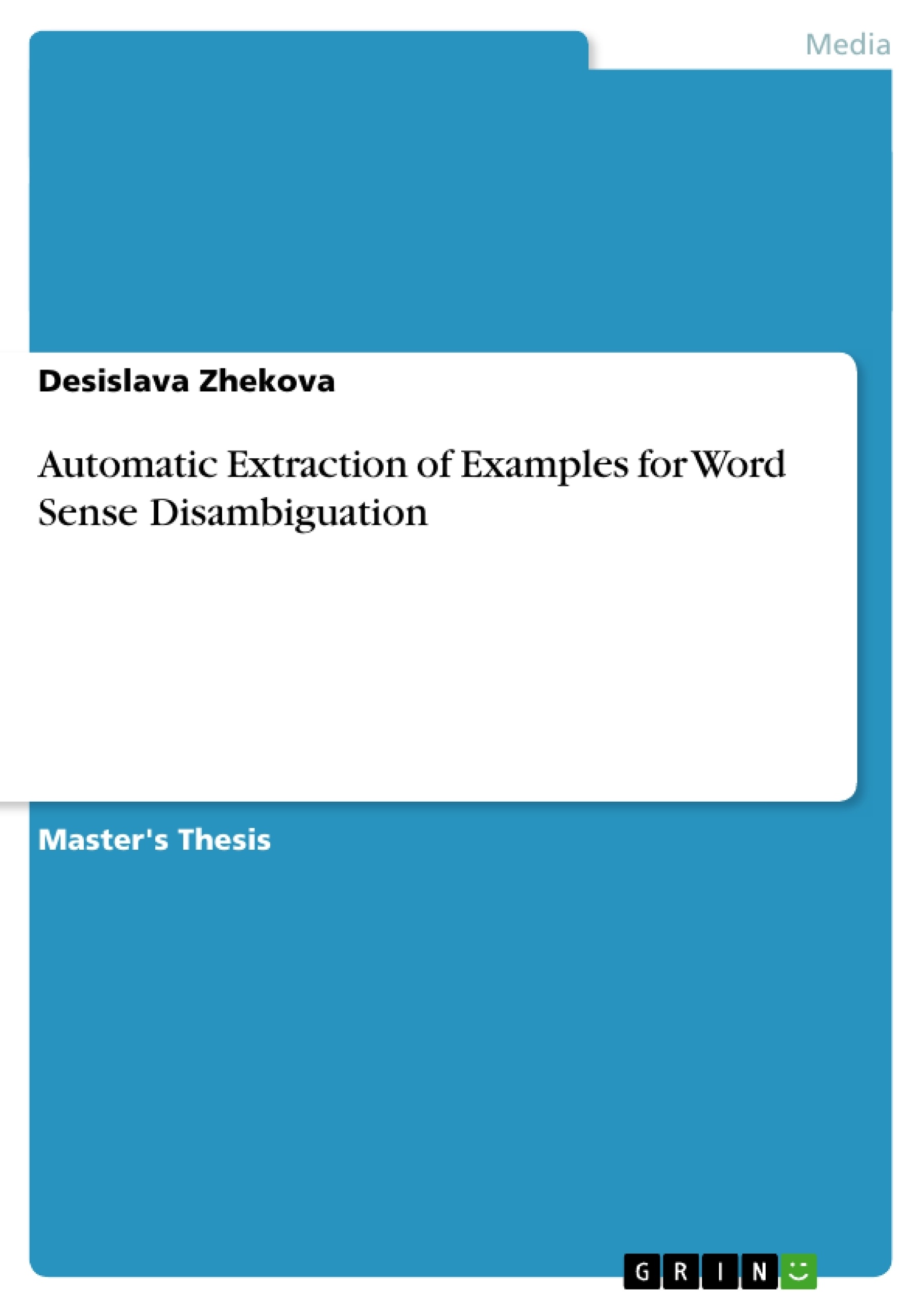In the following thesis we present a memory-based word sense disambiguation system, which makes use of automatic feature selection and minimal parameter optimization. We show that the system performs competitive to other state-of-art systems and use it further for evaluation of automatically acquired data for word sense disambiguation.
The goal of the thesis is to demonstrate that automatically extracted examples for word sense disambiguation can help increase the performance of supervised approaches. We conducted several experiments and discussed their results in order to illustrate the advantages and disadvantages of the automatically acquired data.
Inhaltsverzeichnis (Table of Contents)
- Introduction
- Basic Approaches to Word Sense Disambiguation
- Knowledge-Based
- The Lesk Algorithm.
- Alternative Methods
- Unsupervised Corpus-Based
- Distributional Methods.
- Translational Equivalence Methods
- Supervised Corpus-Based
- Sense Inventories
- Source Corpora
- Data Preprocessing
- Feature Vectors
- Supervised WSD Algorithms
- Semi-Supervised Corpus-Based
- Knowledge-Based
- Comparability for WSD Systems
- Differences between WSD Systems
- Most Frequently Used Baselines
- The Lesk Algorithm.
- Most Frequent Sense
- Random Choice
- Evaluation of WSD Systems
- Fundamentals in Evaluation of WSD Systems
- International Evaluation Exercise Senseval.
Zielsetzung und Themenschwerpunkte (Objectives and Key Themes)
This thesis explores the use of automatically extracted examples for word sense disambiguation (WSD) to improve the performance of supervised WSD approaches. It presents a memory-based WSD system that utilizes automatic feature selection and minimal parameter optimization.- Evaluating the effectiveness of automatically acquired data for WSD
- Comparing the performance of the developed system to existing state-of-the-art WSD systems
- Analyzing the advantages and disadvantages of using automatically acquired data for WSD
- Investigating the impact of automatic feature selection on WSD system performance
- Exploring the potential of memory-based approaches for WSD tasks
Zusammenfassung der Kapitel (Chapter Summaries)
- Introduction: This chapter provides a brief overview of the field of word sense disambiguation and introduces the core research question of the thesis.
- Basic Approaches to Word Sense Disambiguation: This chapter presents a comprehensive overview of different approaches to WSD, including knowledge-based, unsupervised corpus-based, supervised corpus-based, and semi-supervised corpus-based methods. Each approach is discussed in detail, highlighting key techniques, advantages, and limitations.
- Comparability for WSD Systems: This chapter examines the challenges of comparing different WSD systems and discusses commonly used baseline methods, such as the Lesk algorithm, Most Frequent Sense, and Random Choice.
- Evaluation of WSD Systems: This chapter delves into the evaluation of WSD systems, focusing on fundamental evaluation metrics and the influential Senseval initiative, which plays a significant role in benchmarking WSD system performance.
Schlüsselwörter (Keywords)
The primary focus of this thesis lies on the development and evaluation of a memory-based word sense disambiguation system, utilizing automatic feature selection and minimal parameter optimization, for the purpose of enhancing supervised WSD approaches. Key concepts include automatic feature selection, supervised WSD algorithms, automatically acquired data, memory-based approaches, and the Senseval evaluation framework. The thesis aims to contribute to the ongoing research in WSD by demonstrating the potential of automatically extracted examples for improving the performance of supervised WSD systems.- Quote paper
- Desislava Zhekova (Author), 2009, Automatic Extraction of Examples for Word Sense Disambiguation, Munich, GRIN Verlag, https://www.grin.com/document/267346




